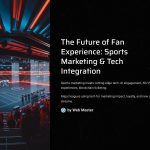 Sports marketing has undergone a radical transformation through its intersection with cutting-edge technology. From AI-driven fan engagement to immersive AR/VR experiences and blockchain ticketing, today’s sports industry is a playground of innovation. Major leagues and clubs are turning to tech not just for performance enhancement but also for maximizing marketing impact, increasing loyalty, and opening up new revenue streams. This trend is not only reshaping how fans interact with their favorite teams but also redefining what it means to be a part of the sports community. As 2025 sees even greater digital convergence, these real-world examples show where we’re headed — and how brands are winning big by embracing tech.
Sports marketing has undergone a radical transformation through its intersection with cutting-edge technology. From AI-driven fan engagement to immersive AR/VR experiences and blockchain ticketing, today’s sports industry is a playground of innovation. Major leagues and clubs are turning to tech not just for performance enhancement but also for maximizing marketing impact, increasing loyalty, and opening up new revenue streams. This trend is not only reshaping how fans interact with their favorite teams but also redefining what it means to be a part of the sports community. As 2025 sees even greater digital convergence, these real-world examples show where we’re headed — and how brands are winning big by embracing tech.

Nike and AR: Immersive Sneaker Drops in the Metaverse
Nike has revolutionized product launches by integrating augmented reality and metaverse platforms into their sports marketing campaigns. Through its SNKRS app and collaborations with platforms like Roblox and RTFKT, Nike enables users to experience virtual try-ons and participate in gamified events that reflect cultural sports moments. These digital touchpoints drive buzz, significantly increase user interaction time, and expand Nike’s footprint among Gen Z and Millennial demographics, who favor digital-first experiences over traditional advertising.

Manchester City and Cisco: Smart Stadium Experiences
Manchester City’s partnership with Cisco represents one of the most advanced uses of IoT and networking in sports marketing. The Etihad Stadium is equipped with high-speed Wi-Fi, real-time analytics, and fan engagement dashboards, allowing fans to instantly share experiences, check stats, and even order food via smart devices. These enhancements improve the in-stadium experience and deepen brand loyalty through personalized digital interactions, showcasing how tech can make fans feel closer to the action.

NBA and Blockchain: Digital Collectibles and Fan Tokens
The NBA has leveraged blockchain through the introduction of NBA Top Shot, a platform offering limited-edition digital collectibles of iconic moments. These NFTs not only serve as revenue generators but also foster a sense of exclusivity and community among fans. Furthermore, teams are exploring fan tokens via platforms like Socios.com, enabling fans to vote on club decisions or access exclusive merchandise, merging fandom with financial engagement.

Formula 1 and AWS: Real-Time Data as Content
Formula 1’s collaboration with Amazon Web Services (AWS) has transformed how the sport is marketed and consumed. Using AI and machine learning, F1 now delivers real-time race insights, driver stats, and predictive analytics during live broadcasts. These data-driven narratives enrich viewer experience and create new engagement layers, making each race not just a sport event but a tech-powered storytelling opportunity.

Adidas and AI: Personalized Marketing at Scale
Adidas has incorporated artificial intelligence into its sports marketing strategy through product recommendations, content personalization, and demand forecasting. Its AI system analyzes browsing behavior, purchase history, and location data to deliver hyper-personalized shopping experiences. As a result, Adidas has improved customer retention rates and increased conversion by delivering the right message to the right fan at the right time — automatically.

Tokyo Olympics 2020 and 5G: A Broadcasting Milestone
The Tokyo 2020 Olympics set a new standard in tech-driven sports marketing through the extensive use of 5G and 8K broadcasting. With partnerships involving Intel, NTT Docomo, and NHsports marketing and technology integrationK, viewers experienced ultra-fast, high-resolution, and multi-angle broadcasts in real-time. This enabled unprecedented access to behind-the-scenes footage, athlete cams, and real-time stats, transforming passive viewers into fully immersed participants.
*Capturing unauthorized images is prohibited*







